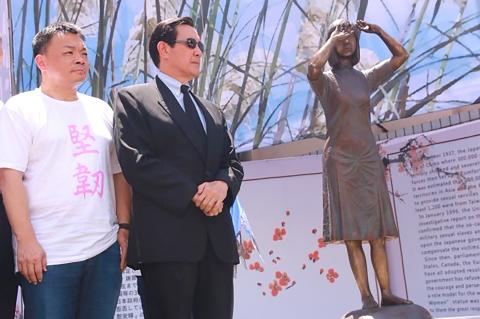The Ministry of Foreign Affairs yesterday reiterated its unwavering stance on the issue of “comfort women,” after Japan expressed “extreme disappointment” over the installation of Taiwan’s first bronze statue honoring comfort women in Tainan.
“The government has always paid close attention to the issue of comfort women. Our stance on the matter, as well as our policy to fight for their dignity, remains unchanged,” ministry spokesman Andrew Lee (李憲章) said in a news release, adding that negotiations with Japan on the matter would continue.
The government did not play a part in the erection of the statue by a civic group in Tainan on Tuesday to mark International Comfort Women Day, Lee added.

Photo courtesy of Chinese Nationalist Party (KMT) Tainan mayoral candidate Kao Su-po
The ministry’s remarks came just hours after Japan Broadcasting Corp (NHK) reported that Japanese Chief Cabinet Secretary Yoshihide Suga lamented the statue’s installation during a news conference after a Cabinet meeting in Japan.
“The establishment and exhibition of comfort women statues in various parts of the world is extremely disappointing, as it is not compatible with the position and efforts of the Japanese government so far,” Suga was quoted by the NHK as saying.
The statue in Tainan, which stands on an open space next to the Chinese Nationalist Party’s (KMT) Tainan chapter office, was erected by the non-profit Tainan Association for Comfort Women’s Rights, with assistance from the KMT.
Some Japanese media have speculated that the move was motivated by Taiwan’s nine-in-one elections in November, and was part of the KMT’s efforts to criticize the generally friendly stance of the Democratic Progressive Party administration toward Japan.
The Taipei Women’s Rescue Foundation estimates that about 2,000 Taiwanese women were forced into sexual slavery by the Imperial Japanese Army during World War II.
The Asian Women’s Fund — a quasi-public organization established by the Japanese government in 1995 to address the issue through “atonement” projects, before dissolving it in 2007 — had tried to offer Taiwanese victims compensation of ¥2 million (US$18,014 at the current exchange rate) per person and a letter of apology.
However, some Taiwanese victims refused to accept the money as they felt it did not show that the Japanese government was taking responsibility for their actions.
The Japan-Taiwan Exchange Association in Taipei yesterday declined to comment on the matter, saying only that the Japanese government had tried to address the issue through various measures taken by the Asian Women’s Fund.

MAKING WAVES: China’s maritime militia could become a nontraditional threat in war, clogging up shipping lanes to prevent US or Japanese intervention, a report said About 1,900 Chinese ships flying flags of convenience and fishing vessels that participated in China’s military exercises around Taiwan last month and in January last year have been listed for monitoring, Coast Guard Administration (CGA) Deputy Director-General Hsieh Ching-chin (謝慶欽) said yesterday. Following amendments to the Commercial Port Act (商港法) and the Law of Ships (船舶法) last month, the CGA can designate possible berthing areas or deny ports of call for vessels suspected of loitering around areas where undersea cables can be accessed, Oceans Affairs Council Minister Kuan Bi-ling (管碧玲) said. The list of suspected ships, originally 300, had risen to about

DAREDEVIL: Honnold said it had always been a dream of his to climb Taipei 101, while a Netflix producer said the skyscraper was ‘a real icon of this country’ US climber Alex Honnold yesterday took on Taiwan’s tallest building, becoming the first person to scale Taipei 101 without a rope, harness or safety net. Hundreds of spectators gathered at the base of the 101-story skyscraper to watch Honnold, 40, embark on his daredevil feat, which was also broadcast live on Netflix. Dressed in a red T-shirt and yellow custom-made climbing shoes, Honnold swiftly moved up the southeast face of the glass and steel building. At one point, he stepped onto a platform midway up to wave down at fans and onlookers who were taking photos. People watching from inside

Japan’s strategic alliance with the US would collapse if Tokyo were to turn away from a conflict in Taiwan, Japanese Prime Minister Sanae Takaichi said yesterday, but distanced herself from previous comments that suggested a possible military response in such an event. Takaichi expressed her latest views on a nationally broadcast TV program late on Monday, where an opposition party leader criticized her for igniting tensions with China with the earlier remarks. Ties between Japan and China have sunk to the worst level in years after Takaichi said in November that a hypothetical Chinese attack on Taiwan could bring about a Japanese

The WHO ignored early COVID-19 warnings from Taiwan, US Deputy Secretary of Health and Human Services Jim O’Neill said on Friday, as part of justification for Washington withdrawing from the global health body. US Secretary of State Marco Rubio on Thursday said that the US was pulling out of the UN agency, as it failed to fulfill its responsibilities during the COVID-19 pandemic. The WHO “ignored early COVID warnings from Taiwan in 2019 by pretending Taiwan did not exist, O’Neill wrote on X on Friday, Taiwan time. “It ignored rigorous science and promoted lockdowns.” The US will “continue international coordination on infectious